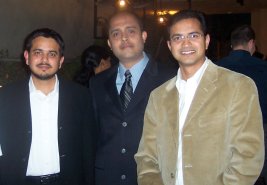Owais Mughal
 Measuring success is a relative term. A type of success where most people seem to agree is the success in one’s profession. Pakistan’s public universities and colleges, inspite of their little known world status, have repeatedly produced people who have excelled at all world forums. We have one such recent success to report where members of Pakistani diaspora; all with education from a public university of Pakistan; have excelled in their profession internationally.
Measuring success is a relative term. A type of success where most people seem to agree is the success in one’s profession. Pakistan’s public universities and colleges, inspite of their little known world status, have repeatedly produced people who have excelled at all world forums. We have one such recent success to report where members of Pakistani diaspora; all with education from a public university of Pakistan; have excelled in their profession internationally.
 The sucess story is of a hi-tech company in US which went public yesterday and got listed at NASDAQ. The Company’s name is Cavium Networks. It was co-founded in 2000 by Raghib Hussain, a graduate from NED University of Engineering and Technology Karachi. After the initial set-up, Raghib was joined by Amer Haider and Imran Badr; also the graduates of NED; who helped in establishing the marketing and software departments for the company respectively.
The sucess story is of a hi-tech company in US which went public yesterday and got listed at NASDAQ. The Company’s name is Cavium Networks. It was co-founded in 2000 by Raghib Hussain, a graduate from NED University of Engineering and Technology Karachi. After the initial set-up, Raghib was joined by Amer Haider and Imran Badr; also the graduates of NED; who helped in establishing the marketing and software departments for the company respectively.
 While many years of hardwork brought the success to these gentlemen and their team, the point to be noted is their roots of technical skills and education which was imparted to them in public institutions of Pakistan. I read it at PASHA (Pakistan Software Houses Assosiation) website that it is the story of people who are making it big from the corridors of NED university to Wall Street.
While many years of hardwork brought the success to these gentlemen and their team, the point to be noted is their roots of technical skills and education which was imparted to them in public institutions of Pakistan. I read it at PASHA (Pakistan Software Houses Assosiation) website that it is the story of people who are making it big from the corridors of NED university to Wall Street.
Up until 18-20 years ago, the three main characters of our success story, probably oblivious of each other’s existence, were studying at three different Government owned pre-engineering colleges of Karachi.  Raghib went to Karachi’s Delhi Science College.
Raghib went to Karachi’s Delhi Science College.
Photo to the left is a satellite image of Delhi College Karachi.
Amer Haider went to DJ (Dayaram Jethmal) Science college and Imran Badr went to Malir Cantt college. Good grades in their HSC exams got these gentlemen an admission into a public sector university (NED). Raghib was two years senior than Amer Haider and Imran Badr and went on to graduate as a Computer Systems Engineer in 1993.Amer Haider graduated as a Mechanical Engineer and Imran as an Electrical Engineer in 1995.
Despite graduating from the same university the paths of these three?gentlemen were still very different. Raghib started his career working at Zelin (Pvt.) Ltd., and then ITIM Associates in Karachi before moving to US.
Amer Haideralso started his technical and management career in Karachi with Wavetech and other local concerns before moving to the US.
Imran Badr worked in Karachi for 4 years with local companies and Reuters before moving to the US.

In the photo above the three gentlemen standing from L to R are Amer Haider, Imran Badar and Raghib Hussain
Along the way,few more NEDians have been joined the team; specifically Faisal Masood, Syed Saadullah Hussain in Software and Sabahat Ashraf the lead technical writer. The total work force strength of the company has now grown up to 177.
Yesterday was a big day in this company’s history as it went public and we wish all the stakeholders good luck. We would also like to hear more stories of succes from you where Pakistani diaspora coming from Public institutions have done well in their profession. Please share your thoughts and experiences below.
Acknowledgements: Special thanks to iFaqeer who provided me with background material and two photos for this article.




















































Kamala, your sentiments are equally shared by many of us. Your comment is well written and understood.
[quote comment=”46249″]
Basically, India had two main advantages: the first mover’s advantage and the fact that it has a large number of graduates. Now that India has already made a name for itself, Pakistan, being a late starter, is finding it hard to catch up, and this has naturally become more difficult after 911 due to our serious image problem.
[/quote]
You missed out the biggest one really: English language. Cost savings, every third world nation can provide, so no comparitive advantage there.
And the other less visible advantage is a large group of now established professionals in corporate America with ties to India.
[quote post=”692″]I’m no fan of India,[/quote]
I have a question for you Eidee Man, why do you say that?
I’m of Indian origin. I love this blog and the discussions on it. It helps me learn so much about Pakistan-its culture, history, music, and of course food.
Let me first at the outset clarify where I am coming from. I was born in South India(post partition generation), and grew up with none of the hangups a lot of my North Indian compatriots have about Pakistan.I regret that my schooling did not equip me with much knowledge about your great country,but thankfully did not prejudice me in anyway against it; so when I did have a opportunity to interact with Pakistanis in the United States, I could do so with an open mind. In fact Professor Najam,who taught me, was one of the first Pakistanis I interacted with.
Yes, I have heard most of the arguments about why the two countries have such a tortured history ; but it has been over sixty years since partition.And yes, I’ve also heard all the arguments about how my compatriots often provoke fights, are pompous, and generally act despicably.Arguments that are justified in many cases.
Here is my one cent take on Pakistan- India relations:as countries, we spent sixty years pointing fingers and being belligerent, and where has that got us?
India-Pakistani relations need not be a zero-sum game. Whether we like it or not our countries are neighbors and if Europeans with their history of wars and mutual animosities can bury their differences, why cannot India and Pakistan?
I guess, the point I am trying to make is that people make up countries and if people like us can get over mutual suspicions, do you think we have a future where the real issues of poverty and disease and illiteracy can be tackled?
I cannot speak for everyone, but here is one Indian holding out her hand in friendship ( no strings attached) to you and any Pakistani who might want to grasp it.
I think people are right in saying that we shoudl care more about the colleges we went to in Pakistan when we succeed. But also the colleges shoudl go out of their wayto find their successful graduates and honor them, that way the links will bemaintained
[quote comment=”46249″]I have no personal experience of the IT industry, but
I am told that outsourcing to India is not as smooth as it is often made out to be. From what I have heard, not all Indian IT graduates are bombshells, in fact most of them are average, and many frustrating mistakes are also made in outsourcing projects before preparing a final product.
Basically, India had two main advantages: the first mover’s advantage and the fact that it has a large number of graduates. Now that India has already made a name for itself, Pakistan, being a late starter, is finding it hard to catch up, and this has naturally become more difficult after 911 due to our serious image problem.
Pakistanis who think India’s IT success is due to its democracy are also grossly mistaken, it’s got more to do with visionary leadership. If any of our earlier leaders (civilian or military) had invested a bit in education and if Bhutto had not nationalized the industry, things might have turned out differently for us too regardless of the crisis with democracy.[/quote]
Yes, as always, I find it hard to disagree with Aqil. India’s success in this area is largely attributable to some of its good policies on education. I’m no fan of India, but one must acknowledge the great job they have done in building and maintaining the IITs, for example. THIS, and not governmental reforms, is their core strength.
Also, I find the Economist editor’s comments completely absurd. He’s basically giving the same excuses tabloids give to publish garbage. This reminds me of a Wall Street Journal article published in March 2003 on the World Cup match between Pakistan and India. It was written by an Indian and was insanely derogatory towards Pakistanis.